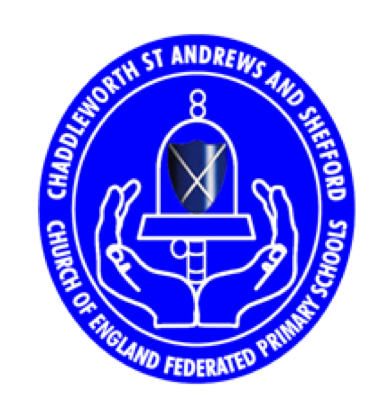EYFS
Early Years Foundation Stage
Intent
At Chaddleworth St. Andrew’s and Shefford Federated Primary Schools, we recognise that during the important early years of a child’s life, play is essential for their development.
The EYFS is based upon four principles:
- A unique child
- Positive relationships
- Enabling environments with teaching and support from adults
- Learning and development
We understand the crucial role that early years education has to play in providing firm foundations upon which the rest of a child’s education is successfully based. Therefore, we offer a rich and diverse play based curriculum that firstly builds on prior knowledge and secondly embeds our Christian values – Courage, Compassion, Trust, Friendship, Wisdom and Endurance.
Our curriculum is ambitious, coherently planned and sequenced. It is broad and balanced, language rich, flexible and centred around our children’s interests. We foster warm and positive relationships between staff and children, as well as strong relationships with parents and the local and wider community.
Our EYFS curriculum encourages children to be creative, curious learners, independent and interactive. It allows children to build confidence, to think critically about problems and explore solutions. We offer a stimulating environment that engages learners, provides exciting opportunities, promotes challenge and adventure, prepares the children fully for their transition into Year 1 and above all else develops a real love of learning. Our whole school vision ‘Living life in all its fullness’, reflects our commitment to enabling all pupils to achieve their full potential and nurtures a lifelong love of learning.
Our Curriculum
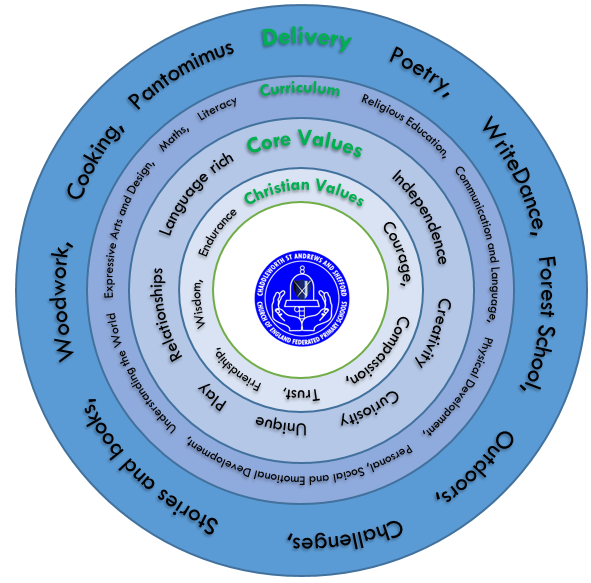
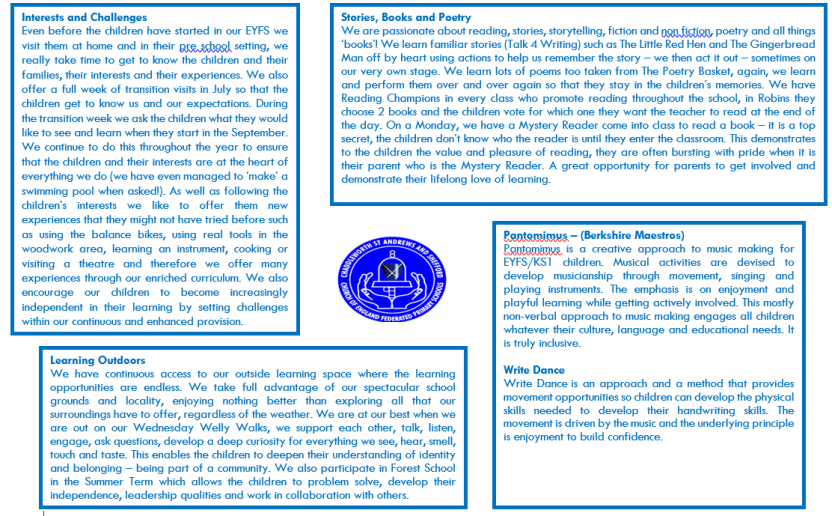
See it all in action!
Having read all of the above, take a look at the termly videos below to see us all in action and don’t forget to visit our weekly class blog where you will find out even more about our learning!
Implementation
The Statutory EYFS Framework
There are three prime areas and four specific areas of learning.
The three prime areas of learning are:
- Communication and Language Development
- Personal, Social and Emotional Development
- Physical Development
The four core areas of learning are:
- Literacy
- Maths
- Understanding the World
- Expressive Arts and Design
In addition, the ‘Characteristics of Effective Learning’ underpin learning and development across all areas and support the child to remain an effective and motivated learner.
The three characteristics of effective teaching and learning are:
- Playing and exploring – children investigate and experience things, and ‘have a go’.
- Active learning – children concentrate and keep on trying if they encounter difficulties, and enjoy achievements.
- Creating and thinking critically – children have and develop their own ideas, make links between ideas, and develop strategies for doing things.
How do we deliver the Statutory Framework in EYFS?
In Robins, you may see children playing alone or with their peers, deciding on resources and choosing how to spend their time. You may see children playing and listening to an adult, who is modelling how to achieve something or teaching a new skill that interests the children. Adults may scaffold children’s play. This involves taking their play to higher levels of learning, entering the play as a co-creator and helping the children go from “what they know” to “what else they could know”. Scaffolding enables children to solve a problem, carry out a task or achieve a goal which is just beyond their abilities. During play, where foundational social and emotional skills are developed, scaffolding is a bridge to new skill levels using three main elements; modelling the skill, giving clues and asking questions while the children are trying out a new skill, and then as the children approaches mastery, withdrawing the support.
The new statutory framework does not prescribe a particular teaching approach. The DfE (2021) states in the framework (p16) that “Play is essential for children’s development, building their confidence as they learn to explore, relate to others, set their own goals and solve problems. Children learn by leading their own play, and by taking part in play which is guided by adults.”
In Chaddleworth St Andrew’s and Shefford School, we decide what we want our children to learn, through our provision, and the most effective ways to teach it. Each day, we stimulate children’s interests, respond to each child’s emerging needs and guide their development through warm, positive interactions coupled with secure routines for play and learning. As children grow older and develop their skills throughout the Reception year, we use more direct teaching and modelling and plan specific sequences of lessons. These strategies help us to focus on teaching the essential skills and knowledge in specific areas of learning so that children develop the skills and confidence required for the end of their Reception year.
Seven Key Features of Effective Practice
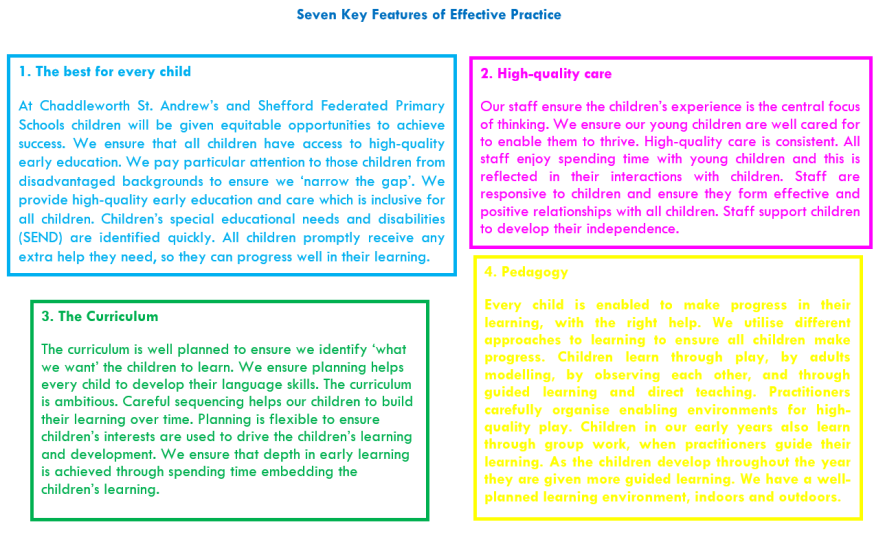
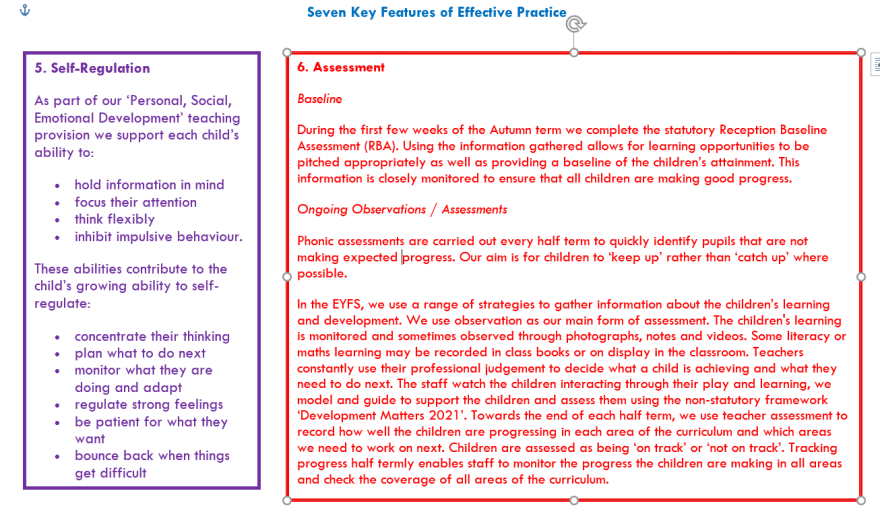
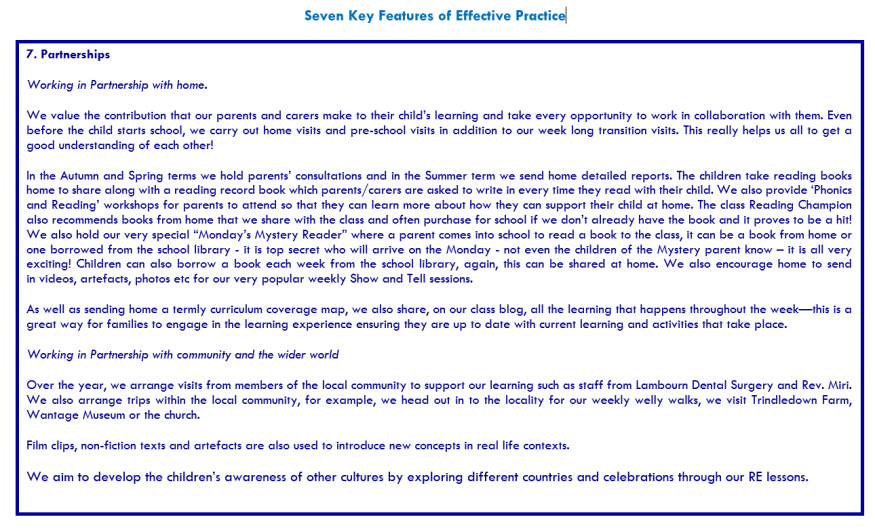
Impact
Early Learning Goals
In the Summer term, we review the ELGs in the EYFS Profile to decide whether each child is working at or below the expected levels. Judgements against the ELGs are based on observations, evidence in books and discussions with all staff involved with the child. The results of the Profile are shared with parents and carers via a report. After this, there is an opportunity to meet the class teacher to discuss the report.
Impact is also evident through our successful transitions into Year 1. EYFS staff have a good understanding of how ELG’s link to the National Curriculum, and through our robust planning and delivery across the spectrum of subjects – both core and foundation - children leave the EYFS with the skills, knowledge and confidence to continue their journey as scientists, historians, artists and geographers.
